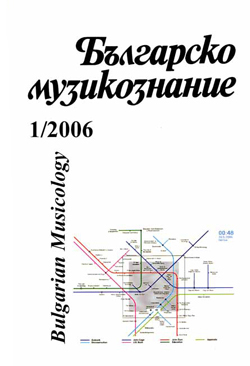Композиторски рефлексии върху най-новата съвременност
Composers Reflections on the Modern Life
Author(s): Dimiter ChristoffSubject(s): Music
Published by: Институт за изследване на изкуствата, Българска академия на науките
Summary/Abstract: The whole human history is a whirlpool of omnipotent taboos and their bloodshed destruction at time of inevitability and since human beings are directly influenced by such excess, the musical reflections of the authors seems to be sympathetic. There is a taboo in Western Europe that can be symbolized by no Marx. In Aastern Europe former socialist countries form a taboo that can be symbolized as pro-Marx. These general science attitudes are transferred to public space and the artistic view of the world. The Western 201h century reacts to it by a static picture of musical reflection, representing the process of reflection, but not the emotional content. In Eastern Europe the existing pro-Marx taboo tends to dynamics, emotionally coloured, with great interest to content. Is the composer coming from the state doctrine about musical art independent? He is not independent, and that is true also for their Western colleagues, speaking of the second half of the 20th century. At the end of the 20th century some assessments of the past artistic events are changing. This happens under the pressure of accumulated experience. In the beginning of the century Debussy (together with Ravel) is connected to impressionism in the fine arts, but the connection loosens in the scientific mental construct in the second half of the century. Now Debussy’s work is discussed by its own value, there is a tendency of his generalized meaningfulness. Artistic ways of Schonberg and Webern cease to be discussed as universal, but strictly individual. Neoclassicism in the first half of the 20111 century is discussed as an individual method of one of the most successful composers interested in it - Stravinsky. The situation in Bulgaria is to overcome the general belatedness in reflections even in the early 70s of the 20th century. Bulgarian strong technological development ahead meets the support from the world’s swaying backwards through postmodern reflections. The two tendencies meet and equal together. At that point the Bulgarian composer starts solving problems at the level of global issues and even exhibits radicalism himself. He finds sympathy for his own non-conventionality in the country, but is broadly misunderstood abroad since some of the proposed by him solutions are beyond the worked out there decisions.
Journal: Българско музикознание
- Issue Year: 2006
- Issue No: 1
- Page Range: 3-29
- Page Count: 27
- Language: Bulgarian
- Content File-PDF

